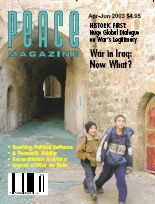
Peace Magazine Apr-Jun 2003, page 4. Some rights reserved.
Search for other articles by PMag staff here
Now that war is on, we ask: What mistakes led to this? And: What next?
The biggest mistake was to ignore the conflict in Israel and Palestine. It is the basic source of resentment toward the United States, and unless it is resolved honorably and justly, the hatred will continue long beyond the war that it engendered . We will focus on that conflict in two articles of this issue.
And peace activists made mistakes too. We should have been the first to say that George W. Bush was right about one thing: the need for regime change in Iraq. We should have been leading the call for that- but only with nonviolent means, and only by Iraqi people themselves. The truth is, a large proportion of Iraqis were willing to accept an invasion, with all that it brings, to get rid of the dictatorship. According to legal principles proposed by the international committee we described in the January issue, states have a responsibility to protect their own citizens. If instead they abuse them, as in Iraq, they cannot take refuge in the usual rules of sovereignty. The international community may legitimately intervene against such a state. And, having been complicit in imposing sanctions that caused the deaths of a million or so Iraqis, we have a moral duty now to intervene and help them - but, contrary to Bush's way of doing things, only nonviolently.
Not all forms of intervention are legitimate. It would be fair and appropriate to help the Iraqi people organize their own nonviolent resistance, just as happened when Serbians got rid of Milosevic with the support of US government funding. Where bombing Serbia failed, a nonviolent revolution succeeded. If the US government would restrict its interventions to aiding nonviolent opponents of tyrants, the world would admire it instead of regarding it as more dangerous than Saddam Hussein himself. See John Bacher's article on Robert Helvey on how this might have happened. We should have promoted such proposals from the rooftops.
There is every reason to hope that Iraqis could (at least with training) liberate themselves, using political defiance, just as Filipinos got rid of Marcos and as Eastern Europeans nonviolently toppled Communist states. Unfortunately, this does not always bring an accountable new regime instantly. Democracy may take a long time. For example, getting rid of Milosevic did not immediately bring good governance to Serbia - as the recent murder of Zoran Djindjic shows - and neither Afghanistan nor Iraq will likely become democratic soon, especially if their liberation is violent. We can't help much with that. But their democratization must start with liberation, and we can help them achieve that - nonviolently.
Anyway, war has begun, and the question now is: What can be done? The most promising proposal seems to be for governments to invoke the "Uniting for Peace" resolution at the United Nations. This would call an emergency session of the General Assembly to vote for a cease-fire and US withdrawal from Iraq. Canada may not be prepared to take such a bold initiative, but some other countries may. That is an option that should be discussed immediately. If the US should (surprisingly) accept such a decision, withdrawal would leave the dictatorship in power in Iraq. But it would not preclude the other option: international support for a nonviolent revolution by the Iraqi people. That is what should have happened long ago.

Peace Magazine Apr-Jun 2003, page 4. Some rights reserved.
Search for other articles by PMag staff here